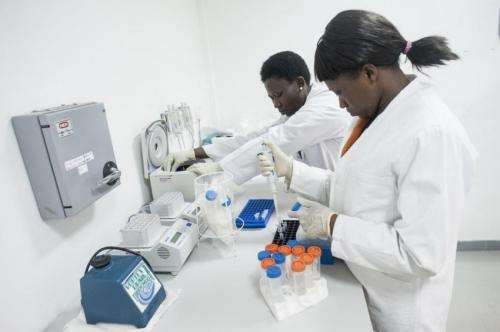DNDi receives US$10 million from USAID to develop new drugs for neglected filaria patients

The Drugs for Neglected Diseases initiative (DNDi) has been awarded US$ 10 million by the United States Agency for International Development (USAID) to develop new treatments for onchocerciasis (river blindness) and lymphatic filariasis (elephantiasis) - the first-ever USAID grant for neglected tropical disease research and development (R&D).
Filarial parasitic worms cause river blindness, which infects 25 million people and is the world's second-leading infectious cause of blindness, and elephantiasis, which infects over 120 million people and is the world's second most common cause of long-term disability. Both diseases inflict immense suffering in affected communities. Filarial diseases cause life-long disabilities, including massively swollen limbs and genitals, blindness, intense pain, and severe itching, as well as social stigmatization.
'We are pleased to be working together with the U.S. government to address urgent unmet patient needs', said Rachel M. Cohen, Regional Executive Director of DNDi North America. 'We hope that this new USAID commitment to innovative R&D for neglected tropical diseases will pave the way for other governments to engage in this lifesaving work.'
Control strategies have for decades revolved around mass drug administration of donated medicines. However, the drugs used in these treatments kill mainly juvenile worms (microfilariae) meaning adult worms (macrofilariae) can continue to produce new offspring. Mass administration of drugs must therefore be carried out repeatedly, over the course of five to 17 years, until the adult worms die out naturally. While these treatments have been effective in reducing transmission and illness in affected communities, patients who receive them are not free of infection and continue to suffer from symptoms.
Existing filarial drugs, when used in mass drug administration programs, can also pose life-threatening side effects in river blindness or elephantiasis patients co-infected with another filarial infection, Loa loa, primarily in Central Africa. These drugs can result in the sudden, massive death of juvenile Loa loa worms that overwhelms the body and causes serious neurological damage or even death.
'A billion people are at risk of filarial diseases, yet there has been little R&D for new drugs in the last forty years. Without new health tools we will not reach the World Health Organization targets for eliminating these diseases', said Dr Bernard Pécoul, Executive Director of DNDi. 'We urgently need a safe, short-course drug that can be used to treat individual patients and shorten mass drug administration programs.'
USAID and DNDi have established a Global Development Alliance to support these R&D needs. A key component of this multiyear project will include support for strengthening local clinical research capacity in filaria-endemic countries through a regional clinical research network.
'Through our direct support of this project, USAID will ensure that promising new breakthrough medicines for filarial diseases can be rapidly evaluated, registered and made available to patients', said Dr Ariel Pablos-Mendez, Assistant Administrator for Global Health, USAID. 'DNDi is an important player in global health innovation, access to medicines and the fight against neglected diseases. We look forward to working together to eliminate the neglect of millions of poor people in need and at risk.'
Provided by Drugs for Neglected Diseases Initiative